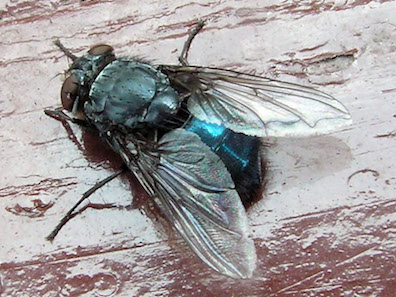Bloom was stung in the garden area behind his house on May
23. In Calypso he has a fragmentary thought: "Still
gardens have their drawbacks. That bee or bluebottle here
Whitmonday." In Lestrygonians readers learn what
both the insect and Bloom did on that day: "Still I got to
know that young Dixon who dressed that sting for me in the Mater." Young Dixon makes
up one of the crew of medicals in Oxen of the Sun.
Recognizing Bloom, he invites him into the common room to
share in the revelry there, and at the end of the chapter he
tells someone in Burke's pub about the bee sting.
Whitmonday is the day after Whitsunday, which falls on the
seventh Sunday after Easter. Gifford notes that it is a bank holiday in Ireland,
which suggests that Bloom may have been enjoying himself at
home at the end of a three-day weekend when the incident
occurred. Many people would remember a bee stinging them three
weeks earlier, but not many (unless they were severely
allergic) would run to the nearby hospital to be treated by a
doctor. Bloom's infantile alarm confirms what Molly thinks
about him in Penelope: "if his nose bleeds
youd think it was O tragic."
At the beginning of Oxen of the Sun Bloom is
talking with Nurse Callan when a door opens, revealing the
riotous young men in the common room. "And there came against
the place as they stood a young learningknight yclept Dixon.
And the traveller Leopold was couth to him sithen it had
happed that they had had ado each with other in the house of
misericord where this learningknight lay by cause the
traveller Leopold came there to be healed for he was sore
wounded in his breast by a spear wherewith a horrible and
dreadful dragon was smitten him for which he did do
make a salve of volatile salt and chrism as much as he
might suffice. And he said now that he should go into that
castle for to make merry with them that were there." The
hilarious medieval parody transforms the bee into a terrifying
dragon, and the detail of how Dixon treated his patient
further emphasizes Bloom's overreaction. One can make such a
"chrism" for oneself, at home, with baking soda and water.
At the end of Oxen the two men are apparently
standing in different parts of the pub because someone is
asking Dixon about Bloom's bee sting: "Got a pectoral
trauma, eh, Dix? Pos fact. Got bet be a boomblebee whenever
he wus settin sleepin in hes bit garten. Digs up near the
Mater." Still another bit of literary hyperbole lurks
slyly in Dixon's recollection that Bloom was sleeping in his
garden. Hamlet Senior was doing the same thing when his
brother snuck up and poured poison in his ear, producing a
horrifyingly violent death. Everything in Joyce's narrative
seems to conspire to affirm Molly's judgment that when some
minor affliction befalls her husband it is "O tragic."
Bloom's reaction to "That bee or bluebottle" betrays a lack
not only of physical courage but also of entomological
curiosity. Bees sting, but bluebottles do not. Slightly larger
than houseflies, they have much the same anatomy and behavior.
Dixon has inferred from the details of Bloom's account that
what actually stung him must have been a bumblebee.

